文献阅读与翻译
Unit2文献阅读与翻译第二章
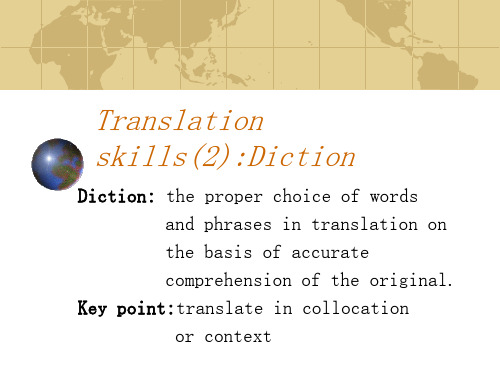
Eg.1:Tension is building up.
形势紧张起来。 张力在增大。 电压在增加。 压力在增强。 ……
Eg.2: the English word of story
This war is becoming the most important story of this generation. (事件) It is quite another story now, for the leadership has changed. (情况) Some reporters who were not included in the session broke the story. (内情) A young man came to a police officer’s office with a story.
(3)Judging from the Context and Collocation
科技文献阅读和翻译

• • • • • • • • •
3. Webs for translating a. / b. / 4. the best webs for dictionary A. / B. / C. / D. / E. /
科技论文标题的写法
二、介词词组 介词词组由介词十名词或名词词组构成。如果整个标题就 是 一 个 介 词 词 组 的 话 , 一 般 这 个 介 词 是 “ on” , 意 思 是 “对……的研究”。 例如: From Knowledge Engineering to Knowledge Management (介词词组+介词词组) On the correlation between working memory capacity and performance on intelligence tests
学术论文的英文写作简介
(2) 关于建议可用如下表达方式。
① It is advantageous to (do) ② It should be realized (emphasized, stressed, noted, pointed out ) that … ③ It is suggested (proposed, recommended, desirable) that … ④ It would be better (helpful, advisable) that…
学术论文的英文写作简介
四、结尾部分 1、致谢 为了对曾给予支持与帮助或关心的人表示感谢,在论文之后,作 者通常对有关人员致以简短的谢词,可用如下方式: I am thankful to sb. for sth I am grateful to sb. for sth I am deeply indebted to sb. for sth Thanks are due to sb. for sth The author wishes to express his sincere appreciation to sb. for sth. The author wishes to acknowledge sb. The author wishes to express his gratitude for sth.
文献阅读与翻译 第一章译文参考

U1 General DescriptionII. Translation1. Put the following sentences into Chinese, using either literal or free translation. 1) It was the best of times, it was the worst of times; it was the age of wisdom, it was the age of foolishness; it was the epoch of belief, it was the epoch of incredulity; itwas the season of the Light, it was the season of Darkness; it was the spring of Hope,it was the winter of Despair; we had everything before us, we had nothing before us; we were all going to Heaven, we were all going direct the other way.这是最美好的时期,这是最坏的时期,这是智慧的年代,这是愚蠢的年代,这是从满信仰的时代,这是顾虑重重的时代,这是光明的季节,这是黑暗的季节,这是富有希望的春天,这是充满绝望的寒冬;我们拥有一切,我们一无所有;我们正笔直走向天堂,我们正笔直走向地狱。
2) A greeting card can warm a heart, hold a hand, lend an ear, pat a back, light up a face, tickle a funny bone, dry an eye, surprise a child, woo a sweetheart, toast a bride, welcome a stranger, wave a good-bye, shout a bravo, blow a kiss, mend a quarrel, ease a pain, boost a morale, stop a worry and start a tradition.一张小小贺卡可以温暖一颗心,握紧一双手,倾听肺腑言,轻拍友人背;它另人喜洋洋,撩得心痒痒,抹去泪汪汪;它给孩子以惊喜,给恋人以温纯,给新娘以祝福,给路人以欢迎;它可用以挥手道别,高声喝彩,遥寄飞吻,也可用以弥补嫌隙,减轻痛苦,提高士气,解除忧虑,开创一种新风尚。
文献阅读与翻译(精华版)

Unit 1 general description of literature reading and translation1.Definition of LiteratureLiterature is a general term for professional writings in the form of books, papers, and other documentations.As an important means for preserving knowledge, literatures have become precious resources or treasures for the mankind, which have greatly contributed to the social progress of the human race.2.Classification of Literature1) Textbooks(课本) a kind of professional writing(一种专业的写作)2) Monographs(专著) various viewpoints and discussions3) Papers(论文) the theoretical analysis and experimental descriptiontitle, author, affiliation, abstract, keywords, introduction, theoretical analysis and/or experimental description, results and discussion or conclusion, acknowledgments, references4) Encyclopedias(百科全书) every branch of knowledge5) Periodicals (期刊) a series of publications6)Special Documentation(特殊文档) all the printed materials3.Linguistic Features of Scientific Literaturestylistically (文体上) scientific literature is a kind of form writing;syntactically(结构上)scientific literature has rigorous grammatical structures and in most cases is rather unitary;Morphologically(语法上)scientific literaure is featured by high specialization,the use of technical terms and jargons ,unambiguous implication and the fixed sense of the wordPrinciples or Criteria of TranslationWhenever principles or criteria of translation are under discussion in China, Yan Fu’s three- character guide”-----xin, da, ya, namely, faithfulness (信), expressiveness (达), and elegance (雅). These three principle has always been regarded as a plumb-line for measuring the professional level of translation and a goal for translators to strive after. However, in the application of this principle, people come to find some unsatisfactory aspects of the three-character guide and have put foreword a variety of new standards or criteria of translation. Despite a variety of opinions, two criteria are almost unanimously accepted by all, namely, the criterion of faithfulness/accuracy (忠实/准确) and that of smoothness (流畅). We may also take these two criteria as the principle scientific literature translation. By faithful/accuracy, we mean to be faithful not only to the original contents, to the original meaning and views, but also to the original form and style. By smoothness, we mean not only easy and readable rendering, but also idiomatic expression in the target language, free form stiff formula and mechanical copying form dictionaries.Unit 2 professional papers2.1.Definition of professional papersA professional paper is a typewritten paper in which professionals present their views and research findings on a chosen topic. It is variously known as the “research paper”, “course paper”, “thesis paper” or “library paper”. The task of the author of a paper is essentially the same: to read on a particular topic, gather information about it, and report the findings in it.2.2.Classification of professional papers1)Report PaperThe report paper summarizes and reports the findings of another on a particular subject. The writer neither judges nor evaluates the findings, but merely catalogs them in a sensible sequence2) Research paperA research paper can be intelligent, well informed, interesting, and original in its conclusions.3) Course Papercourse papers are written after a specific course is learned or are designed at the end of a term. This type of paper is, therefore, also called “term paper”.4) Thesis Paperthe thesis paper takes a definite stand on an issue. A thesis is a proposition or point of view that a writer or speaker is willing to argue against or defend. A paper that argued for ratification of a certain event would therefore be a thesis paper. Writing a thesis paper requires a writer to exercise judgment, evaluate evidence, and construct a logical argument, whereas writing a report paper does not2.3. Linguistic Features of Professional PapersFormal Style: A professional paper deals with the study of some objective facts or problems, and the conclusion that is drawn should be based on relevant data, not on personal likes and dislikes. Specialized Terms:The terms in professional papers are typically specialized. Even in the same field, the meanings of the same word may vary slightly due to its different collections.Take the word “normal” as an example. Generally, it means “iEee”; but in mathematics, it represents “法线”; and in the field of chemistry, “当量” Again the word “power.” In electronics, it is rendered as “电力” or “电源”; in mechanics, “动力”; whereas in mathematics, “幂”Rigid Sentence Structure:The arguments in professional papers will be convincing if they are presented concisely and concretely. A rigid sentence structure is therefore reflected to meet this requirement.Formatted Elements:Though there are no set rules, a complete professional paper in its finished form usually has a regular format composed of the following elements: the title, author(s), affiliation(s), abstract, keywords, introduction, body of the paper (theoretical description including calculation, inference, reasoning, conclusion, etc. or experimental description including techniques, methods, materials, results and analysis, etc.), acknowledgments, appendices, references or bibliography, etc.Different meaning of story(1)This war is becoming the most important story of this generation. Event这场战争将成为这一代人经历的最重大的事件。
ipad文献阅读翻译

iPad文献阅读翻译是一个将文献资料从英文翻译成中文的功能。
对于需要阅读英文文献,但英语水平不够高的用户来说,这个功能非常有用。
使用iPad上的翻译软件或在线翻译工具,用户可以将文献资料导入到软件中,选择翻译语言,然后软件会自动将英文翻译成中文。
一些翻译软件还支持实时翻译,用户可以在阅读文献的同时进行翻译。
此外,iPad文献阅读翻译还可以帮助用户更好地理解文献内容。
对于一些专业术语或复杂的句子结构,翻译软件可以提供准确的中文翻译,帮助用户更好地理解文献内容。
这有助于提高用户的阅读效率和阅读质量,让他们更好地掌握相关领域的知识。
需要注意的是,翻译软件并不能完全代替人工翻译,对于一些复杂的句子结构或专业术语,可能需要进行人工校对和调整。
此外,对于一些不常见的文献格式或特殊排版要求,翻译软件可能无法完全满足用户的需求。
因此,在使用iPad文献阅读翻译功能时,用户需要谨慎选择合适的翻译软件,并根据实际情况进行必要的调整和校对。
江苏大学研究生文献阅读与翻译作业
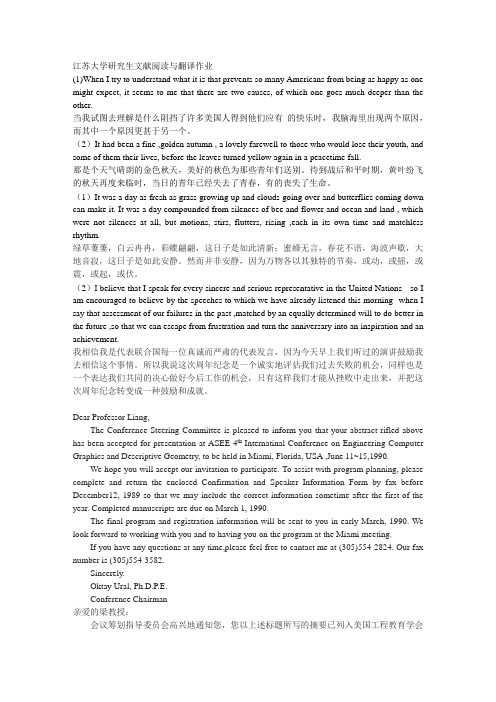
江苏大学研究生文献阅读与翻译作业(1)When I try to understand what it is that prevents so many Americans from being as happy as one might expect, it seems to me that there are two causes, of which one goes much deeper than the other.当我试图去理解是什么阻挡了许多美国人得到他们应有的快乐时,我脑海里出现两个原因,而其中一个原因更甚于另一个。
(2)It had been a fine ,golden autumn , a lovely farewell to those who would lose their youth, and some of them their lives, before the leaves turned yellow again in a peacetime fall.那是个天气晴朗的金色秋天,美好的秋色为那些青年们送别。
待到战后和平时期,黄叶纷飞的秋天再度来临时,当日的青年已经失去了青春,有的丧失了生命。
(1)It was a day as fresh as grass growing up and clouds going over and butterflies coming down can make it. It was a day compounded from silences of bee and flower and ocean and land , which were not silences at all, but motions, stirs, flutters, rising ,each in its own time and matchless rhythm.绿草萋萋,白云冉冉,彩蝶翩翩,这日子是如此清新;蜜蜂无言,春花不语,海波声歇,大地音寂,这日子是如此安静。
同济大学文献阅读与翻译笔记整理
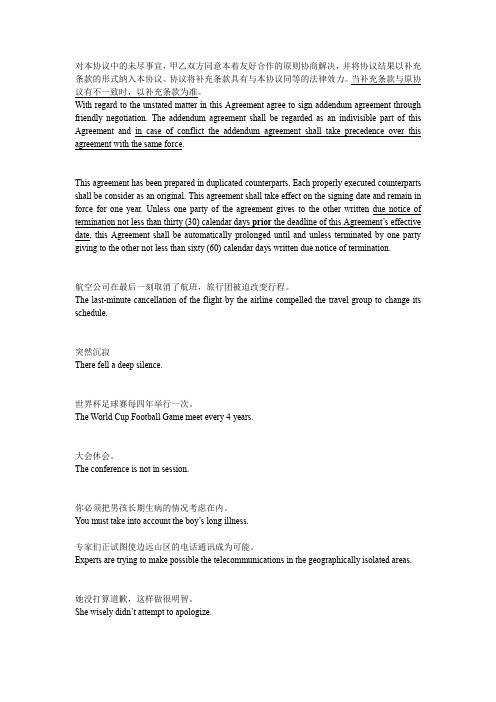
对本协议中的未尽事宜,甲乙双方同意本着友好合作的原则协商解决,并将协议结果以补充条款的形式纳入本协议。
协议将补充条款具有与本协议同等的法律效力。
当补充条款与原协议有不一致时,以补充条款为准。
With regard to the unstated matter in this Agreement agree to sign addendum agreement through friendly negotiation. The addendum agreement shall be regarded as an indivisible part of this Agreement and in case of conflict the addendum agreement shall take precedence over this agreement with the same force.This agreement has been prepared in duplicated counterparts. Each properly executed counterparts shall be consider as an original. This agreement shall take effect on the signing date and remain in force for one year. Unless one party of the agreement gives to the other written due notice of termination not less than thirty (30) calendar days prior the deadline of this Agreement’s effective date, this Agreement shall be automatically prolonged until and unless terminated by one party giving to the other not less than sixty (60) calendar days written due notice of termination.航空公司在最后一刻取消了航班,旅行团被迫改变行程。
文献阅读翻译
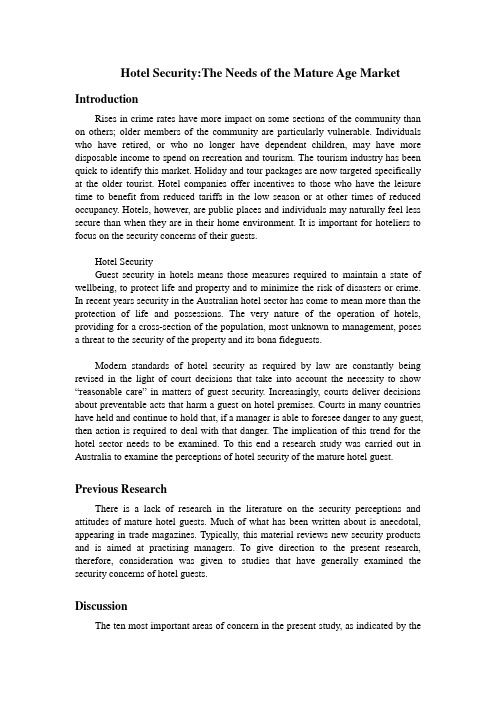
Hotel Security:The Needs of the Mature Age Market IntroductionRises in crime rates have more impact on some sections of the community than on others; older members of the community are particularly vulnerable. Individuals who have retired, or who no longer have dependent children, may have more disposable income to spend on recreation and tourism. The tourism industry has been quick to identify this market. Holiday and tour packages are now targeted specifically at the older tourist. Hotel companies offer incentives to those who have the leisure time to benefit from reduced tariffs in the low season or at other times of reduced occupancy. Hotels, however, are public places and individuals may naturally feel less secure than when they are in their home environment. It is important for hoteliers to focus on the security concerns of their guests.Hotel SecurityGuest security in hotels means those measures required to maintain a state of wellbeing, to protect life and property and to minimize the risk of disasters or crime. In recent years security in the Australian hotel sector has come to mean more than the protection of life and possessions. The very nature of the operation of hotels, providing for a cross-section of the population, most unknown to management, poses a threat to the security of the property and its bona fideguests.Modern standards of hotel security as required by law are constantly being revised in the light of court decisions that take into account the necessity to show “reasonable care” i n matters of guest security. Increasingly, courts deliver decisions about preventable acts that harm a guest on hotel premises. Courts in many countries have held and continue to hold that, if a manager is able to foresee danger to any guest, then action is required to deal with that danger. The implication of this trend for the hotel sector needs to be examined. To this end a research study was carried out in Australia to examine the perceptions of hotel security of the mature hotel guest. Previous ResearchThere is a lack of research in the literature on the security perceptions and attitudes of mature hotel guests. Much of what has been written about is anecdotal, appearing in trade magazines. Typically, this material reviews new security products and is aimed at practising managers. To give direction to the present research, therefore, consideration was given to studies that have generally examined the security concerns of hotel guests.DiscussionThe ten most important areas of concern in the present study, as indicated by themean for each question and ranging from most to least important, were: emergency telephone number by bed; well-lit hotel corridors; door security chains; security liability insurance; bomb threat procedures; security personnel trained in unarmed defence; security officers having knowledge of civil and criminal law; closed circuit TV in hotel car parks; advising guests of criminal activity near hotel; and, control of access to guest areas. Ten least important areas were (from least important): plain clothes security officers carrying firearms; uniformed officers carrying firearms; the searching of guest’s luggage; carrying of handcuffs by security personnel; number of arrests and convictions by hotel security being an important indicator of effectiveness; electronic “sweeping”; guards controlling hotel entrances; security patrols by plain clothes security personnel; security patrols by uniformed security personnel; and, the need for female security officers. This later ranking is an interpretation placed on the data by the researchers, as respondents were merely asked to strongly agree, or otherwise, with statements about security.When the results of both studies are compared in Table V, agreement on the non deployment of armed hotel security personnel is clear. There was no support for this concept, as it received the lowest overall rating. Other responses are less easy to classify. The statement “When it comes to hotel security, prevention is better than cure”, which was included a s a check for consistency, received a mean score of 4.698 and rated a tied second place. This contrasts with the respondents’ perceptions on preventative security measures, for example uniformed security patrols. Only ten respondents agreed and twostrongly agreed with the need for security patrols.There is considerable clustering of the data that correspond to items 5, 10, 13, 17 and 22. These relate to security patrols by uniformed personnel, security departments that have a high level of detection are effective departments; carrying of handcuffs by security personnel; electronic sweeping to prevent eavesdropping; and a statement that says “the standard of security in hotels is adequate”. This would appear to indicate that a majority of the respondents were indifferent about these aspects of security. An inspection of the means and standard deviations of these items supports this contention.ConclusionThis research has indicated some areas that the industry may wish to consider for the development and adoption of standards of security. The provision of door security chains, ranked number 3 in Rutherford and McConnell’s research and number 4 in the present study illustrates this, and relates to the provision of reasonable care by the management of the hotel.It has been suggested that the concept of “reasonable care” should be the basis of all security policies[13]. This requirement is derived from common law, under whicha citizen may sue another individual or corporation. For a plaintiff to win a negligence case, four elements must be present. The first is duty; there is a duty on persons to exercise reasonable care in their dealings with other people. Second is a breach of that duty. The third is proximate cause; lack of reasonable care should be the primary reason for the plaintiff to bring a complaint. Finally, there is the matter of damages. The plaintiff should have incurred damages for which he or she is seeking recompense. It might be inferred from this that there is a duty on the hotel management, for example, to equip doors with security chains. It is the duty of the guest to use them to prevent intruders from entering the room.If the hotel does not equip guest rooms with this relatively inexpensive security precaution and the guest is subsequently robbed or harmed by an intruder, then it can be strongly argued that the hotel management did not exercise reasonable care by not providing a door chain. More importantly, was the fact that a chain was not provided the proximate cause of the guest being robbed? If this is the case then the hotel is liable. If courts subsequently find in favour of the guest then it may be argued that door security chains have become a de facto security requirement.A lack of agreed industry standards for security may lead to hotels having court mandated standards imposed upon them. These de facto standards may be at odds withthe level and types of security that this study appears to suggest is acceptable for an important part of the Australian hotel market. With the rising crime statistics management need to be aware of the possibility of unacceptable security requirements being imposed.These results have obvious implications for the management of security in hotels. There is a need for industry wide standards of security. Development of such standards is a significant feature of risk management and should be a high priority for the industry.酒店安全:成熟年龄市场的需求一、摘要犯罪率的上升更多地影响了社会上的部分人;旧社会的成员,特别容易受影响。
文献阅读与翻译
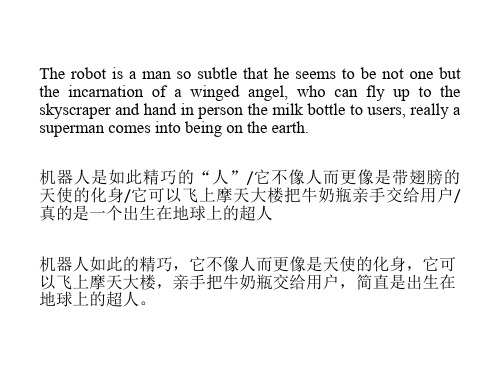
机器人是如此精巧的“人” / 它不像人而更像是带翅膀的 天使的化身/它可以飞上摩天大楼把牛奶瓶亲手交给用户/ 真的是一个出生在地球上的超人
机器人如此的精巧,它不像人而更像是天使的化身,它可 以飞上摩天大楼,亲手把牛奶瓶交给用户,简直是出生在 地球上的超人。
The theory that bacteria are serviceable in devouring contaminants, that repeated experiments have proved it true and that air may be artificially purified through dissociation, that it has so far been in embryo, an advanced one, prevails widely in the domain of environmental science. 细菌可以吞噬污染物/反复的实验证实了这一结论/空气可 以通过离解进行人工净化/这种说法还在萌芽中/超前的理 论/这个理论……在环境科学界很流行 细菌可以吞噬污染物,这一点经过反复实验的证实,空气 可以通过离解进行人工净化,这种说法还处在萌芽中,上 述这些超前的理论在环境科学界很流行。
The robot is a man so subtle that he seems to be not one but the incarnation of a winged angel, who can fly up to the skyscraper and hand in person the milk bottle to users, really a superman comes into being on the earth.
医学英语文献阅读二翻译
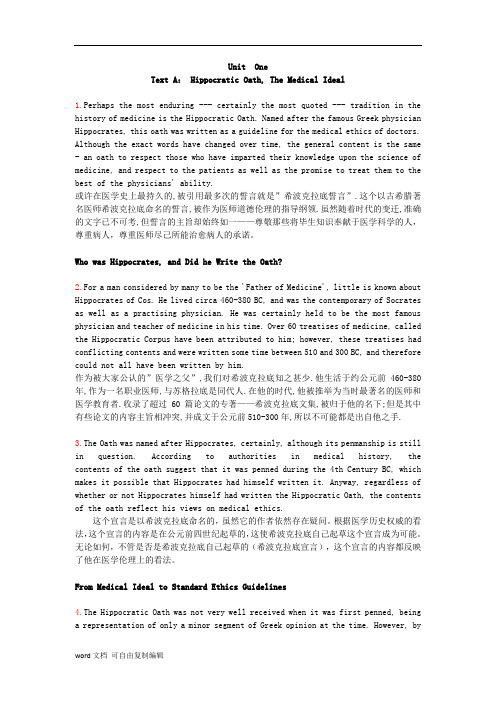
Unit OneText A: Hippocratic Oath, The Medical Ideal1.Perhaps the most enduring --- certainly the most quoted --- tradition in thehistory of medicine is the Hippocratic Oath. Named after the famous Greek physicianHippocrates, this oath was written as a guideline for the medical ethics of doctors.Although the exact words have changed over time, the general content is the same- an oath to respect those who have imparted their knowledge upon the science ofmedicine, and respect to the patients as well as the promise to treat them to thebest of the physicians' ability.或许在医学史上最持久的,被引用最多次的誓言就是”希波克拉底誓言”.这个以古希腊著名医师希波克拉底命名的誓言,被作为医师道德伦理的指导纲领.虽然随着时代的变迁,准确的文字已不可考,但誓言的主旨却始终如一——尊敬那些将毕生知识奉献于医学科学的人,尊重病人,尊重医师尽己所能治愈病人的承诺。
Who was Hippocrates, and Did he Write the Oath?2.For a man considered by many to be the 'Father of Medicine', little is known aboutHippocrates of Cos. He lived circa 460-380 BC, and was the contemporary of Socratesas well as a practising physician. He was certainly held to be the most famousphysician and teacher of medicine in his time. Over 60 treatises of medicine, calledthe Hippocratic Corpus have been attributed to him; however, these treatises hadconflicting contents and were written some time between 510 and 300 BC, and thereforecould not all have been written by him.作为被大家公认的”医学之父”,我们对希波克拉底知之甚少.他生活于约公元前460-380年,作为一名职业医师,与苏格拉底是同代人.在他的时代,他被推举为当时最著名的医师和医学教育者.收录了超过60篇论文的专著——希波克拉底文集,被归于他的名下;但是其中有些论文的内容主旨相冲突,并成文于公元前510-300年,所以不可能都是出自他之手.3.The Oath was named after Hippocrates, certainly, although its penmanship is stillin question. According to authorities in medical history, the contents of the oath suggest that it was penned during the 4th Century BC, whichmakes it possible that Hippocrates had himself written it. Anyway, regardless ofwhether or not Hippocrates himself had written the Hippocratic Oath, the contentsof the oath reflect his views on medical ethics.这个宣言是以希波克拉底命名的,虽然它的作者依然存在疑问。
文献阅读与翻译

Definition of Literature
A set of works on a particular subject; printed material, esp. giving information; the body of writings on a particular subject (scientific literature)
Topical Highlights
Definition of Literature Classification of Literature Linguistic Features of Scientific Literature Translation Skills---on translation in general and translation of special literature Special Attention: The Translation of Documentation
face the powder and not to powder the face.
3. Literal Translation and Free Translation
Literal Translation : phonetic, morphological, syntactic 武装到牙齿 armed to the teeth 象牙塔” ivory tower 趁热打铁 strike while the iron is hot 血浓于水 Blood is thicker than water.
Literal Translation or Free Translation? Don’t take the low-fat label as a license to eat. 不能因为食品标明低脂肪,而敞开食 用。 别把标有“低脂肪”的标签看成是可 “敞开食用”的许可证。
ipad文献阅读翻译

ipad文献阅读翻译
iPad文献阅读翻译,指的是将相关文献的内容进行翻译,适用于在iPad设备上进行文献阅读的场景。
iPad文献阅读翻译可以通过以下步骤实现:
1. 在iPad上下载并安装适用于文献阅读的应用程序,例如EndNote、Zotero等。
这些应用程序通常可以实现文献管理和导入文献的功能。
2. 通过在应用程序中搜索相关文献,可以找到需要阅读和翻译的文献。
3. 对于不是母语的文献,可以将文献中的内容复制到翻译应用程序或在线翻译工具中进行翻译。
常用的翻译应用程序有Google翻译、百度翻译等。
4. 将需要翻译的文献内容粘贴到翻译应用程序中,并选择翻译的源语言和目标语言。
5. 进行翻译后,可以在翻译应用程序中查看翻译后的内容,并进行必要的修改和调整。
6. 将翻译后的内容复制到文献阅读应用程序中,可以继续阅读和分析翻译后的文献。
通过以上步骤,可以在iPad上实现文献的阅读和翻译。
这种
方式方便快捷,适用于需要在移动设备上进行文献阅读的研究人员和学生。
Unit12文献阅读与翻译第12章

(3) Translated into Chinese Adverbial Clauses of Condition
Turn off the switch when anything goes wrong with the machine.
如果机器发生故障,就把电门关上。
Translation Skills(12): Subordinate Clauses(c) Adverbial Clauses
Adverbial clauses
English adverbial clauses include adverbials of time, place, cause, condition, concession, purpose, result, and so on. Generally speaking, these adverbial clauses do not pose any obstacle to either comprehension or translation, and the point is how to conform the translations to Chinese usage, especially how to arrange them properly. And another point for attention is how to omit the unnecessary conjunctive words when English adverbial clauses are translated into Chinese.
(1)她不老实,我不能信任她。
Since she is not honest, I cannot trust her.
文献阅读与翻译
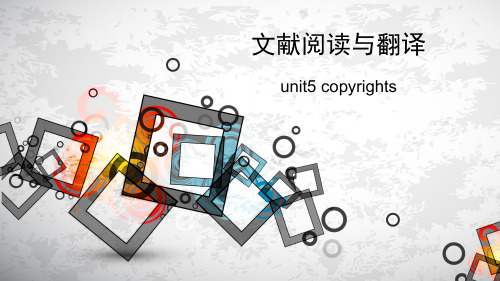
生词
• • • • • • • • • registration n.登记,注册; mandatory adj.强制的; 命令的; deposit n.储蓄,存款; 保证金;付保证金; penalty n.惩罚; 刑罚; 害处; 足球点球; eligible adj.合适的; n.合格者; 合适者; statutory adj.法定的,法令的; 依照法令的; 可依法处罚的; tangible adj.可触知的; 确实的,真实的; 实际的; choreographic adj.舞蹈艺术的; improvisational adj.即兴的;
unit5 copyrights
• 10.Which Works Are Not Protected? Several categories of material are generally not eligible for statutory copyright protection.These include among others: • 什么著作不受保护? 几种类别的材料通常不具有法定版权保护的资格。其中包括:
文献阅读与翻译
unit5 copyrights
unit5 pyrights
• Although a copyright registration is not required,the Copyright Act establishes a mandatory deposit requirement for works published in the U.S.In general,the owner of copyright or the owner of exclusive right of publication in the work has a legal obligation to deposit in the Copyright Office,within 3 months of publication in the U.S.,2copies (or,in the case of sound recordings,2 photo records)for the use of the Library of Congress.
《文献阅读与翻译》课件

检索结果筛选
根据作者、时间、期刊、关键词 等因素,筛选出与研究问题相关 的文献。
二、文献阅读技巧
1 标题、摘要、关键词
快速了解文章中心思想和研究方法。
2 正文阅读方法
拆分、分类、对比、整合,提高理解和记忆能力。
3 笔记与总结
归纳、概括、思考,深入理解文章主旨和重点。
三、翻译技巧
翻译方法
根据语境和读者需求,选择合适的翻译方式。
《文献阅读与翻译》PPT 课件
文献阅读与翻译是科研工作和专业翻译不可缺少的基本技能。通过本课程, 你将掌握文献检索、阅读技巧,以及学术论文写作技巧和翻译方法,提高阅 读效率和翻译质量。
一、文献检索
数据库选择
根据学科特点和数据可靠性,选 择合适的文献数据库。
关键词检索
针对问题和目标运用适当的词汇 进行搜索,缩小结果范围。
翻译要点
注意文章文体、结构和特点,准确翻译专业术语。
翻译练习
多听多说多读多写,不断提高翻译能力和水平。
四、总结与展望
1
学习成果
掌握文献阅读和翻译技巧,提高综合素质和学术能力。
2
自我评价
发现不足和不足,制定个人学习计划和提高方案。
3
学习建议
多参加实践、交流、讨论,深入了解学科和专业前沿动态。
参考资料
书籍推荐
• 《如何阅读一本书》 • 《英语写作与翻译》 • 《论文写作与发表》
网站链接
• 万方数据库 • 谷歌学术 • 知网学术
其他资源
• 在线课程 • 研讨会资料 • 专家指导
江苏大学研究生期末考试硕士文献阅读与翻译整理
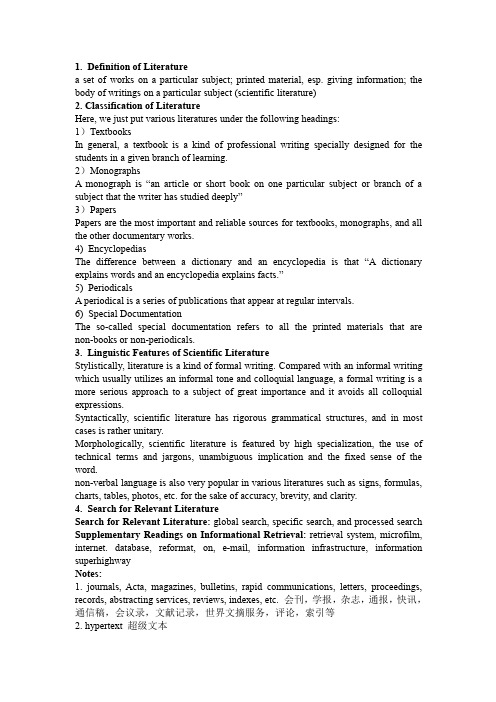
1.Definition of Literaturea set of works on a particular subject;printed material,esp.giving information;the body of writings on a particular subject(scientific literature)2.Classification of LiteratureHere,we just put various literatures under the following headings:1)TextbooksIn general,a textbook is a kind of professional writing specially designed for the students in a given branch of learning.2)MonographsA monograph is“an article or short book on one particular subject or branch of a subject that the writer has studied deeply”3)PapersPapers are the most important and reliable sources for textbooks,monographs,and all the other documentary works.4)EncyclopediasThe difference between a dictionary and an encyclopedia is that“A dictionary explains words and an encyclopedia explains facts.”5)PeriodicalsA periodical is a series of publications that appear at regular intervals.6)Special DocumentationThe so-called special documentation refers to all the printed materials that are non-books or non-periodicals.3.Linguistic Features of Scientific LiteratureStylistically,literature is a kind of formal pared with an informal writing which usually utilizes an informal tone and colloquial language,a formal writing is a more serious approach to a subject of great importance and it avoids all colloquial expressions.Syntactically,scientific literature has rigorous grammatical structures,and in most cases is rather unitary.Morphologically,scientific literature is featured by high specialization,the use of technical terms and jargons,unambiguous implication and the fixed sense of the word.non-verbal language is also very popular in various literatures such as signs,formulas, charts,tables,photos,etc.for the sake of accuracy,brevity,and clarity.4.Search for Relevant LiteratureSearch for Relevant Literature:global search,specific search,and processed search Supplementary Readings on Informational Retrieval:retrieval system,microfilm, internet.database,reformat,on,e-mail,information infrastructure,information superhighwayNotes:1.journals,Acta,magazines,bulletins,rapid communications,letters,proceedings, records,abstracting services,reviews,indexes,etc.会刊,学报,杂志,通报,快讯,通信稿,会议录,文献记录,世界文摘服务,评论,索引等2.hypertext超级文本3.through the Classified and Specified Catalogues通过《分类目录或专题目录》4.through the Newspapers and Journals Indexing通过《全国报刊索引》5.through the Domestic Sci-Tech Data Catalogues通过《国内资料科技目录》6.Sci-Tech Translation Bulletin《科技译文通报》7.the fool collects data and the wise man selects them愚者采集资料,智者选择资料Translation Skills(1):Translation in General and Translation of Special LiteratureTranslation is a rendering of ideas or concepts from one language into another,i.e., the faithful representation in the target language of what is written or said in the original language.A modern society sees an extensive use of translation on various occasions. Proper and dexterous translation helps promote mutual understanding between peoples of different cultural and social backgrounds,whereas improper rendering of words or expressions leads to confusion.Take the ordinary word“menu”for example.Its original meaning is“a list of dishes in a meal or to be ordered as separated meals,esp.in a restaurant”,and the Chinese equivalent seems to be clear:菜单.However,when it is used in computer science,its meaning shifts to“a list shown on the display of a computer from which a user can select the operation the computer is to perform.”1.Nature and Scope of TranslationTranslation covers a very broad range.In terms of languages,it can be divided into two categories:from native languages into foreign languages and vice versa;in terms of the mode,it can be divided into oral interpretation and written translation;in terms of materials to be translated,there are translation of scientific materials, translation of literary works such as novels,stories,prose,poetry,drama,etc., translation of political essays such as treatises on social problems,repons,speeches, etc.,and translation of practical writing(as official documents,contracts and agreements,notices,receipts,etc.);in terms of disposal,it can be either full-text translation,abridged translation or adapted translation.2.Principles or Criteria of TranslationThe so-called principles and criteria of translation are actually the two sides of the same coin.That is,on the part of the translator,he or she should follow them while translating;whereas on the part of the reader or critic,he or she may use the principles and criteria to evaluate translation works.Whenever principles or criteria of translation are under discussion in China,Yan Fu’s“three-character guide”--xin,da, ya,namely,“faithfulness(信),expressiveness(达),and elegance(雅)”,which was first proposed in1898,would evoke controversy.In the past decades,Mr.Yan’s principle has always been regarded as a plumb-line for measuring the professional level of translation and a goal for translators to strive after.However,in the application of this principle,people come to find some unsatisfactory aspects of the three-character guide and have put foreword a variety of new standards or criteria of translation.Despite a variety of opinions,two criteria are almost unanimously accepted byall,namely,the criterion of faithfulness/accuracy(忠实/准确)and that of smoothness (流畅).We may also take these two criteria as the principles of scientific literature translation.By faithfulness/accuracy,we mean to be faithful not only to the original contents,to the original meaning and views,but also to the original form and style.By smoothness,we mean not only easy and readable rendering,but also idiomatic expression in the target language,free from stiff formula and mechanical copying from dictionaries.3.Literal Translation and Free TranslationThe so-called literal translation,superficially speaking,means“not to alter the original words and sentences”;strictly speaking,it strives“to keep the sentiments and style of the original.”For example,crocodile’s tears(鳄鱼的眼泪),armed to the teeth(武装到牙齿),chain reaction(连锁反应),gentlemen’s agreement(君子协定),and so on.Similarly,some Chinese idioms also find their English counterparts through literal translation.For example,纸老虎(paper tiger),一国两制(one country,two systems),and so on.Free translation is an alternative approach which is used mainly to convey the meaning and spirit of the original without trying to reproduce its sentence patterns or figures of speech.Adam’s Apple喉结at sixes and sevens乱七八槽It rains cats and dogs.大雨滂沱Don’t cross the bridge till you get to it.不必担心过早。
收藏知乎网友总结的23种英文文献翻译软件,助力文献阅读
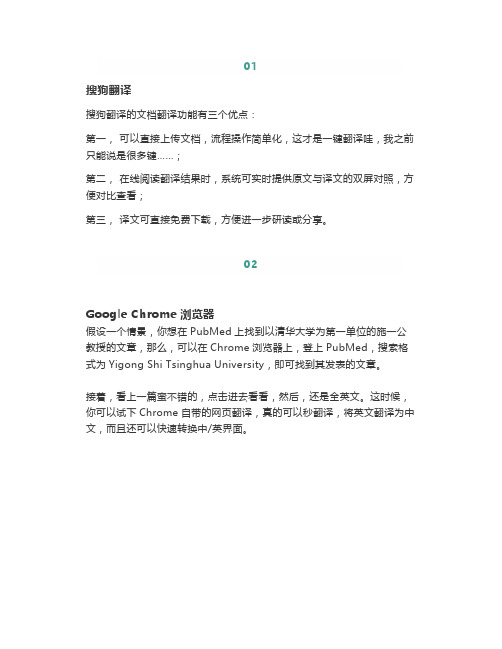
01搜狗翻译搜狗翻译的文档翻译功能有三个优点:第一,可以直接上传文档,流程操作简单化,这才是一键翻译哇,我之前只能说是很多键……;第二,在线阅读翻译结果时,系统可实时提供原文与译文的双屏对照,方便对比查看;第三,译文可直接免费下载,方便进一步研读或分享。
02Google Chrome浏览器假设一个情景,你想在PubMed上找到以清华大学为第一单位的施一公教授的文章,那么,可以在Chrome浏览器上,登上PubMed,搜索格式为Yigong Shi Tsinghua University,即可找到其发表的文章。
接着,看上一篇蛮不错的,点击进去看看,然后,还是全英文。
这时候,你可以试下Chrome自带的网页翻译,真的可以秒翻译,将英文翻译为中文,而且还可以快速转换中/英界面。
03Adobe Acrobat笔者在这里给大伙介绍另一款秒翻译PDF文档的神器(笔者使用的Adobe Acrobat Pro DC,至于具体的下载和安装方式,读者可自行百度)。
但是,需要注意一点,这是Adobe Acrobat,而不是Adobe Reader。
在这里,请应许笔者介绍下开发出Adobe Acrobat的公司——Adobe。
Adobe,在软件界绝对是巨头中巨头的存在。
打个比方,我们常用的PS、PR、AE、In、LR等,无一例外都是领域中的顶尖水平,而且都是Adobe家的。
其中,Adobe家中就有一款几位出色的PDF编辑及处理软件——Adobe Acrobat。
(据说PDF作为国际通用的文件存储格式,也是依它而起)OK,进入主题,Adobe Acrobat是长这个样子的。
它可能干嘛呢?PDF 转word、图片合拼为PDF、编辑PDF等等,可以说,与PDF相关的,它都可以搞定。
那如何使用它来帮助我们翻译文献PDF呢?第一步,用它打开文献PDF文件;第二步,点击使用界面上的“文件”,接着点击“另存为”,选择存储格式为“HTML”,如下图;第三步,PDF文档在导出完成后,会得到两个文件,一是将PDF转为HTML格式的网页文件,另一个则是支持网页文件里面的图片(若删,网页里面的图片显示不出来)第四步,找到网页文件,打开方式选择Google Chrome浏览器,接着,结合Chrome浏览器的网页翻译,即可秒翻。
ipad文献阅读翻译
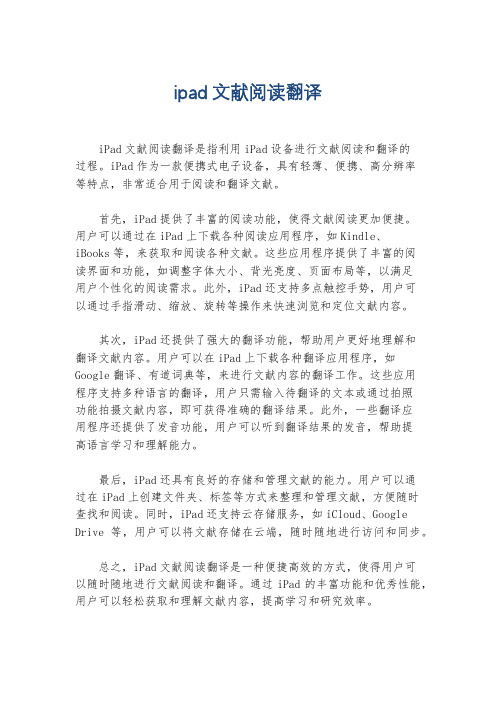
ipad文献阅读翻译iPad文献阅读翻译是指利用iPad设备进行文献阅读和翻译的过程。
iPad作为一款便携式电子设备,具有轻薄、便携、高分辨率等特点,非常适合用于阅读和翻译文献。
首先,iPad提供了丰富的阅读功能,使得文献阅读更加便捷。
用户可以通过在iPad上下载各种阅读应用程序,如Kindle、iBooks等,来获取和阅读各种文献。
这些应用程序提供了丰富的阅读界面和功能,如调整字体大小、背光亮度、页面布局等,以满足用户个性化的阅读需求。
此外,iPad还支持多点触控手势,用户可以通过手指滑动、缩放、旋转等操作来快速浏览和定位文献内容。
其次,iPad还提供了强大的翻译功能,帮助用户更好地理解和翻译文献内容。
用户可以在iPad上下载各种翻译应用程序,如Google翻译、有道词典等,来进行文献内容的翻译工作。
这些应用程序支持多种语言的翻译,用户只需输入待翻译的文本或通过拍照功能拍摄文献内容,即可获得准确的翻译结果。
此外,一些翻译应用程序还提供了发音功能,用户可以听到翻译结果的发音,帮助提高语言学习和理解能力。
最后,iPad还具有良好的存储和管理文献的能力。
用户可以通过在iPad上创建文件夹、标签等方式来整理和管理文献,方便随时查找和阅读。
同时,iPad还支持云存储服务,如iCloud、Google Drive等,用户可以将文献存储在云端,随时随地进行访问和同步。
总之,iPad文献阅读翻译是一种便捷高效的方式,使得用户可以随时随地进行文献阅读和翻译。
通过iPad的丰富功能和优秀性能,用户可以轻松获取和理解文献内容,提高学习和研究效率。
- 1、下载文档前请自行甄别文档内容的完整性,平台不提供额外的编辑、内容补充、找答案等附加服务。
- 2、"仅部分预览"的文档,不可在线预览部分如存在完整性等问题,可反馈申请退款(可完整预览的文档不适用该条件!)。
- 3、如文档侵犯您的权益,请联系客服反馈,我们会尽快为您处理(人工客服工作时间:9:00-18:30)。
Hello,everyone .I am fuxiaoling ,my partners are zhouzan ,huangsuyu ,and huangyanglu.Today we will show you three key parts of the unit one ,they are literature reading ,translation and practice.Now,let us focus on the first part-------literature reading.at the beginning,we should make the definition of literature clear.There seems no substantial difference among its definitions indifferent dictionaries.From the above interpretations, we can arrive at an identical definition of literature: a general term for professional writings in the form of books, papers, and other documentations.The word literature used in this textbook does not mean “文学”, but “文献” or “文献资料”, specifically referring to various documentations in the field of international industrial business and academic exchanges.Since literature is the general term for printd materials, it should be further classified according to what a specific documentary work is.therefore, we can group literature into six categories :1) Textbooks(教科书):In general, a textbook is a kind of professional writing specially designed for the students in a given branch of learning.2) Monographs(专著):A monograph is an artide or short book on one particular subject or branch of a subject that the writer has studied deeply.3) Papers(论文):A complete paper is usually composed of the following elements: title, author, affiliation, abstract, keywords, introduction, theoretical analysis and/or experimental description, results and discussion or conclusion, acknowledgments, references, etc.4) Encyclopedias(百科全书):An encyclopedia is a book or set of books dealing with every branch of knowledge,or with one particular branch, in alphabetical order.5) Periodicals(期刊):A periodical is a series of publications that appear at regular intervals.6) Special Documentation(特别文件):Special documentation refers to all the printed materials that are non-books or non-periodicals.Let us continue the next contextLinguistic Features of Scientific Literature1)Stylistically(在文体上), literature is a kind of formal writing.Compared with an informal writing which usually utilizes an informal tone and colloquial language, a formal writing is a more serious approach to a subject of great importance and it avoids all colloquial expressions.2) Syntactically(在语句构成上), scientific literature has rigorous grammatical structures, and in most cases is rather unitary.3) Morphologically(在词法上), scientific literature is featured by high specialization, the use of technical terms and jargons, unambiguous implication and the fixed sense of the word.There are more compound words, Latin and Greek words, contracted words, noun clusters and so on in scientific literature than in other informational writing.4) Besides, non-verbal language is also very popular in various literatures such as signs, formulas, charts, tables, photos, etc.When it come Searching for Relevant Literature,there are three usual approaches:1) Global Search全局搜索By “global search” we mean to search for materials around the subject in a largerdimension or within a wider range, i.e., conducting the extensive reading.2) Specific Search特定搜索By “specific search”we mean to search for literature about a certain topic within aspecific area or in a narrower scope.3) Processed Search处理搜索By “processed search” we mean to accumulate and absorb essential information inthe course of literature search and reading.The last question of part one is4. What are the points for attention to information retrieval?(信息检索的要点是什么)POINTS: (1) as to the subjects dealt with, particularly subjects concerning with new information given incidentally; and (2) as to the new result and conclusive ideas reported. Material relating to each subject should then be gathered together in a logical way; and (3) all the sentences generalizing the main ideas of all the original materials should be put together so as to be well-versed, abstract-brief, condensed, complete, yet easily readable.In the final analysis, to digest and absorb useful information is the ultimate purpose of literature search and reading. This is a process of discarding the dross and selecting the essential, eliminating the false and retaining the true, proceeding from the easy to the difficult and from the outer to the inner. It is also a process of reading, selecting, sorting, synthesizing, commenting, rationalizing, systematizing, reprocessing, etc.My partner huangyanglu will give you the rest instruction.。
